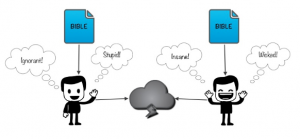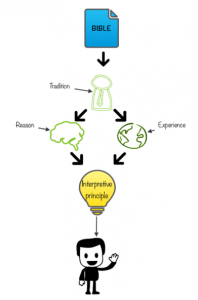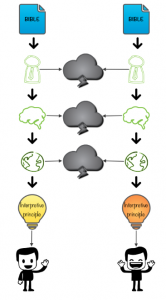After reading dozens of books, writing hundreds of blog posts, engaging in thousands of conversations both online and off, and touring Hellbound? through two dozen cities across North America, you’ll have to forgive me if I’m somewhat pessimistic about our ability to engage in constructive theological dialogue. All too often what starts out as a potentially fruitful conversation ends in a grudging detente with both parties walking away muttering something about the moral defectiveness of the other. “If only they weren’t so (fill in the blank), they would see my position on this issue is correct.” You can only go around the Mulberry Bush like this so many times before wondering, “What’s the point?”
And yet, minds do change all the time. I have certainly experienced radical shifts of opinion on a variety of issues over the years. And the concept of metanoia, a.k.a. “repentance” or “a change of mind” is at the heart of Christianity. As the Apostle Paul tells us, “Do not conform to the pattern of this world, but be transformed by the renewing of your mind. Then you will be able to test and approve what God’s will is—his good, pleasing and perfect will” (Romans 12:2). But how does this transformation process actually happen? And–barring a miraculous encounter with the risen Christ that strikes us blind–why are we so reluctant to surrender our views?
This question has become somewhat of an obsession for me ever since I worked on the documentary Expelled: No Intelligence Allowed. As I plunged into the often vicious debate over evolution, I couldn’t help but wonder how so many intelligent, educated, well meaning people could look at exactly the same data and come away with such drastically different conclusions. And when we fail to convert someone else to our point of view, rather than question the validity of our ideas, why are we so quick to sequester our opponents in one of the categories outlined in the following statement by Richard Dawkins:
It is absolutely safe to say that if you meet somebody who claims not to believe in evolution, that person is ignorant, stupid or insane (or wicked, but I’d rather not consider that).
Over the years, I’ve taken several runs at trying to answer this question, to no avail. But recently I took a different tack and began mapping out all of the variables I could think of that are involved in the belief-formation process. Specifically, I was trying to figure out if there is any way to minimize or eliminate the subjective nature of belief-formation. We all tend to think that we hold a trump card of sorts–a theory of inspiration, Church authority, firsthand, experience or a piece of irrefutable, objective data that cannot be denied in good conscience. However, this exercise has made me increasingly skeptical that such a thing exists.
Of course, this raises the specter of whether we can truly know anything for certain. I think we can, but perhaps not in the way we are prone to think. Over the next several blog posts, I’m going to share a little bit of this work-in-progress. While I don’t intend it as my own version of an irrefutable trump card, this exercise has been a tremendously fruitful experience for me (aided in no small part by an iPad app called Grafio). I hope it will also help you understand why theological debates can become so contentious and suggest how we can move beyond such pointless disputes into more fruitful dialogue.
So let’s get started…
Whenever we approach an object of study, such as the Bible, most of us have a fairly simplistic notion of how we encounter it, which looks something like the illustration below (you can click on the illustrations to make them larger):
I can’t tell you how many times people have based their disagreement with me on the “fact” that something is so “plain and simple” in the Bible. Seeing as we tend to experience our moral beliefs as moral facts, when someone disagrees with our reading of the text, it’s only natural to resort to the epithets described by Richard Dawkins. We attribute the source of the debate to some sort of moral, psychological or even spiritual defect in our opponent. Why else would our opponent disagree with the “clear teaching of Scripture”?
 But this notion is mistaken, because as philosopher of religion Thomas Talbott says, “We don’t read the Bible the way it is, we read it the way we are.” In other words, none of us encounters the Bible–or any text or piece of data–in an objective, unbiased way. We all interpret it through a complex set of filters that I’ll call an “Interpretive Principle.”
But this notion is mistaken, because as philosopher of religion Thomas Talbott says, “We don’t read the Bible the way it is, we read it the way we are.” In other words, none of us encounters the Bible–or any text or piece of data–in an objective, unbiased way. We all interpret it through a complex set of filters that I’ll call an “Interpretive Principle.”
 So when two people argue about what a particular biblical passage means, the dispute isn’t necessarily the product of a moral, psychological or spiritual deficiency on the part of one or both parties (although it very well could be). It’s more likely a clash between competing Interpretive Principles.
So when two people argue about what a particular biblical passage means, the dispute isn’t necessarily the product of a moral, psychological or spiritual deficiency on the part of one or both parties (although it very well could be). It’s more likely a clash between competing Interpretive Principles. But what informs these Interpretive Principles, and why are they so different? We can break these influences down into three main categories: Tradition, Reason and Experience.
But what informs these Interpretive Principles, and why are they so different? We can break these influences down into three main categories: Tradition, Reason and Experience.
For the sake of discussion, I will define these terms as follows:
- Tradition: The established body of beliefs held by the Church or a particular branch of the Church
- Reason: Philosophical or theological arguments
- Experience: Firsthand observation of facts or events
This is where things start to get complicated, because even though we can all agree that Tradition, Reason and Experience play a role in belief-formation, few of us encounter these influences in exactly the same way, leading to the questions in the diagram below:
- Which Tradition–Catholic? Orthodox? Anglican? Some other Protestant tradition?
- Which philosophical or theological arguments do we find most persuasive?
- And which experiences appear to be more valid than others–is there any way to resolve such disputes?
 So when we get into a theological debate, rather than a clash between persons or Interpretive Principles, the actual flashpoint could be any and all of the above.
So when we get into a theological debate, rather than a clash between persons or Interpretive Principles, the actual flashpoint could be any and all of the above.
As you can see, by this point the real locus of dispute is a long way from the text itself. But this is only the first of many ways in which such discussions can become convoluted. In part two of this series, I’ll drop a few more flies into the ointment and show why such discussions can quickly go from bad to worse.











